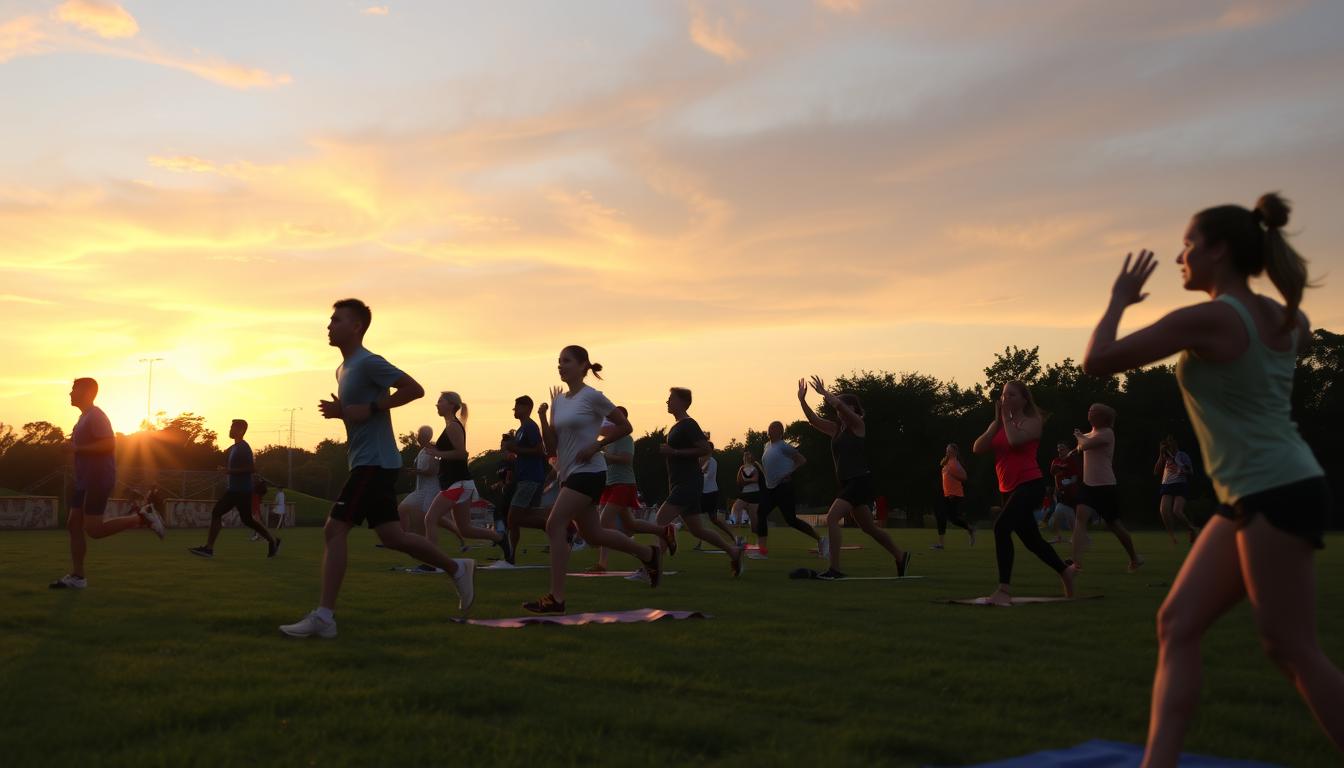Starting your day with exercise can be refreshing and energizing. Exercising before breakfast, known as fasted workouts, is becoming more popular. It involves working out on an empty stomach, usually in the morning.
But is it good for everyone? The debate is ongoing. Some say it boosts fat burning, while others worry about losing muscle and feeling tired. In this article, we’ll explore the truth behind fasted workouts to guide you in your fitness journey.
Key Takeaways
- Fasted workouts involve exercising before breakfast.
- This practice is increasingly popular among fitness enthusiasts.
- Potential benefits include improved fat metabolism and insulin sensitivity.
- Possible drawbacks include muscle loss and reduced energy levels.
- Consult scientific studies and expert opinions for a balanced view.
Is it okay to workout in the morning on an empty stomach?
When we talk about working out in the morning on an empty stomach, it’s key to know what fasted exercise is. It’s about exercising after not eating for a while, usually overnight. Let’s explore this further.
Understanding Fasted Workouts
Fasted workouts mean exercising without eating first. This means doing your workout before breakfast. In this state, your body uses fat for energy more than usual. People have different views on whether fasted workouts are good or safe.
Pros and Cons of Morning Fasted Exercise
Looking at the good and bad sides helps us see if fasted exercise is right for us. Here are some key points:
| Pros | Cons |
|---|---|
| Enhanced Fat Oxidation | Risk of Muscle Catabolism |
| Improved Insulin Sensitivity | Reduced Energy Levels |
| Greater Discipline and Routine | Potential Decrease in Workout Performance |
Studies show fasted exercise might help burn more fat, which is good for losing weight. But, there are downsides like losing muscle and doing worse in workouts. Knowing these points helps us decide if morning fasted workouts are right for us. It’s important to think about our own needs and talk to a doctor first.
Benefits of Exercising Before Breakfast
Many people and health experts say exercising in the morning is great. It’s called exercising in a fasted state. Here are some key benefits:
Increased Fat Burning
One big reason for morning workouts is they help burn more fat. When you exercise before eating, your body uses fat for energy. This is because glycogen levels are low.
Studies show that working out in the morning can lead to more fat loss. As you get used to this, your body gets better at using stored fat.
Improved Insulin Sensitivity
Working out before breakfast also improves how your body handles insulin. This helps keep blood sugar levels stable and boosts metabolic health. Research shows that those who exercise in the morning and eat well have better insulin function.
This not only helps with weight control but also lowers the risk of type 2 diabetes.
Potential Drawbacks of Fasted Exercise
Exercising on an empty stomach has its benefits. But, there are concerns that need to be talked about.
Possible Muscle Loss
One big worry is muscle loss from fasted workouts. When you’re fasting, your body might use muscle protein for energy because it lacks glucose. Studies show that keeping muscle mass can be hard without enough glycogen.
This process, called gluconeogenesis, can cause a lot of muscle loss. It’s especially true when you’re doing intense workouts.
Energy Levels and Workout Performance
Another issue is how fasted workouts affect energy levels. Many people feel tired and can’t perform well without eating first. Research shows that exercising without enough fuel can make workouts less effective.

A study in the American Journal of Clinical Nutrition found that fasted states can hurt your body’s performance and endurance. So, it’s important to keep your energy up during fasted workouts. This helps you reach your fitness goals without negative effects.
How Fasted Workouts Impact Fat-Burning
Exercising on an empty stomach changes how your body uses energy. It starts using fat instead of glycogen for fuel. This happens because your body needs to find another energy source without glucose from food.
Research shows that working out when you’re not hungry boosts fat burning. This method helps burn more fat and improves how your body uses energy. It’s a great way to target fat and make your metabolism better.
Also, fasting workouts can make your body more sensitive to insulin. This means your cells can take in glucose better. This is good for your overall health. Adding effective back cable exercises to your routine can also help.
In short, fasting workouts are great for burning fat and improving insulin sensitivity. They help you reach your fitness goals and keep your metabolism healthy.
Pre-Workout Nutrition: What to Consider
Knowing the value of pre-workout nutrition can greatly improve your workout. Good pre-workout nutrition gives you the energy you need and boosts your performance.
Importance of Hydration
Hydration is key in pre-workout nutrition. It’s vital to keep your body hydrated to avoid feeling tired, dizzy, or performing poorly. Drinking water or an electrolyte drink helps keep your fluids right, letting you perform at your best.
Being well-hydrated also helps your heart work better, which is important for intense workouts. Drinking water all day and especially before working out keeps you from getting dehydrated.
Light Snacks for Better Performance
Along with staying hydrated, eating the right light snacks is also crucial. Foods high in carbs and proteins give you steady energy and prevent muscle damage during exercise. For example:
- A banana with a tablespoon of peanut butter
- Greek yogurt with honey
- A small bowl of oatmeal with berries
The right snacks help keep your energy up and prevent feeling slow. This mix ensures you’re fueling your workout well.
Remember, everyone reacts differently to food. Talking to a sports dietitian can give you tailored advice on what to eat for hydration and energy before your workout. For more on pre-workout supplements, check out this in-depth guide.
Morning Workouts and Intermittent Fasting
Adding intermittent fasting and exercise to your day can really boost your fitness. Many think that exercising on an empty stomach helps burn fat better. It also fits well with the idea of intermittent fasting.
Morning workouts with intermittent fasting have many benefits. One big plus is increased fat oxidation. When you’re fasting, your body uses fat for energy, which helps burn fat more efficiently. Also, exercising in the morning can keep your metabolism high all day, helping with weight loss and fitness.
But, it’s important to think if this mix is right for everyone. Not everyone might see the benefits of fasting and exercise together. It’s smart to talk to fitness experts and know what your body needs. Experts say how well fasting and morning workouts work together can really vary, based on your health, fitness level, and goals.
Working out at home offers more flexibility than the gym, which many people like. This combo lets you create workout plans that fit your daily life. For more on the benefits of home workouts, check out this article.
Here’s a quick look at the good and bad of mixing fasting with morning exercise:
| Benefits | Considerations |
|---|---|
| Enhanced fat burning | May not be suitable for everyone |
| Improved metabolism | Requires adjustment period |
| Increased energy efficiency | Monitoring by fitness professionals |
Common Myths About Empty Stomach Workouts
There’s a lot of talk about fasted workouts, but not all of it is true. Let’s clear up some myths about fasted exercise that confuse the fitness world.
First, the idea that exercising on an empty stomach always leads to better fat loss is not correct. While some studies show more fat burning during fasted exercise, it doesn’t mean you’ll lose more fat overall. Fat loss depends on many things, like how many calories you eat, how active you are, and your metabolism.
Another myth is that fasted workouts are good for everyone. This is not true. People react differently to fasted exercise because of their metabolism, energy levels, and fitness goals. For some, fasted workouts might help with performance and fat burning. But for others, it can cause dizziness, fatigue, and poor performance.
It’s also important to know that muscle loss is a risk with fasted workouts. When glycogen stores are low, the body might use muscle protein for energy, especially during intense workouts. Eating enough protein and planning your workout intensity can help avoid this risk.
Many people believe that hydration isn’t as important during fasted workouts. This is completely wrong. Dehydration can really hurt your performance and recovery. Always make sure to drink enough water, whether you’re exercising fasted or not.
To understand better, here’s a comparison of common beliefs versus proven facts about fasted exercise:
| Myth | Fact |
|---|---|
| Fasted workouts universally lead to better fat loss. | Fat loss is not solely dependent on fasted exercise; it also relies on overall energy balance and metabolism. |
| Everyone benefits equally from fasted workouts. | Individual results vary based on metabolic rates, existing fitness levels, and personal goals. |
| Muscle loss is not a concern. | Muscle protein breakdown can occur if glycogen stores are not replenished, especially in high-intensity activities. |
| Hydration is less important during fasted exercise. | Proper hydration is essential for optimal performance and recovery, irrespective of fasting status. |
Understanding the myths about fasted exercise helps us make better choices for our fitness journey. Remember, fitness is not one-size-fits-all. It’s important to listen to your body and seek advice from experts when needed.
Adjusting Your Workout for Optimal Energy
If you like working out when you’re fasting, it’s key to adjust your routine. This helps keep your energy stable. You’ll need to tweak your warm-up and how hard you work out.
Warm-Up Routines
Starting with a good warm-up is vital. It boosts your energy. Try light jogging, arm circles, and leg swings. These moves get your blood flowing and muscles ready.
Your warm-up should last 10-15 minutes. It should get your heart rate up but not use up all your energy. Here are some good exercises to include:
- Jumping jacks
- Bodyweight squats
- Hip rotations
- High knees
Intensity Adjustments
Changing the intensity of your workout is also important. High-intensity exercises can be tough when you’re fasting. This is because you don’t have as much glycogen. Instead, aim for moderate intensity that you can keep up for longer.
Try interval training. It mixes short, intense bursts with longer, easier periods. This way, you can keep going without getting too tired.
Here’s a table that shows how to adjust your workout for fasting:
| Workout Element | Fasted Workout | Non-Fasted Workout |
|---|---|---|
| Warm-Up Length | 10-15 minutes | 5-10 minutes |
| Intensity Level | Moderate | High |
| Interval Training | Yes (recovery focus) | Optional |
| Workout Duration | 30-45 minutes | 45-60 minutes |
| Rest Periods | Longer (1-2 minutes) | Shorter (30 seconds-1 minute) |
By making these changes, you can improve your workout when fasting. This way, you’ll do better without getting too tired.
Who Should Avoid Fasted Workouts?
Fasted exercise has its benefits, but it’s not for everyone. People with certain health issues or dietary needs should be careful. For example, those with diabetes or low blood pressure might not do well with morning workouts on an empty stomach.

Also, if you’re on specific medications or have certain nutritional needs, talk to your doctor first. Dr. Michael Mosley’s research shows that custom workout and nutrition plans are often better than a one-size-fits-all approach.
Pregnant or breastfeeding women should also steer clear of fasted workouts. They need more energy. People recovering from surgery or illness should focus on balanced nutrition to aid in their healing.
The mental side is important too. Those with a history of eating disorders might find fasted exercise triggering. It’s key to prioritize your health and well-being when considering morning workouts.
Conclusion
Working out on an empty stomach has its ups and downs. Some people like the idea of burning more fat and improving insulin sensitivity. Morning workouts can also be fine-tuned with snacks and water to keep energy up.
But, there are also risks like losing muscle and doing worse in intense workouts. It’s true that with the right plan, empty stomach workouts can be safe and effective.
Deciding to work out in the morning without eating should match your fitness goals and how your body feels. Knowing the good and bad points helps you make a choice that supports your health and fitness. Always listen to your body and talk to a doctor before changing your workout routine.
FAQ
Is it okay to workout in the morning on an empty stomach?
Yes, working out in the morning without eating is okay for some. It depends on your health, fitness, and goals. Some people burn more fat and feel better, while others might feel tired or lose muscle. Always listen to your body and talk to a doctor if you’re unsure.
What are the benefits of exercising before breakfast?
Working out before breakfast might help you burn more fat and improve how your body uses insulin. When you’re not eating, your body uses stored fat for energy. This can help with weight loss and better health.
What are the potential drawbacks of fasted exercise?
Fasted workouts might lead to muscle loss and less energy. This can affect how well you work out. Without glucose, your body might use muscle for energy. You might also feel tired or have less stamina during intense workouts.
How do fasted workouts impact fat-burning?
Fasted workouts can increase fat burning. Your body uses fat instead of stored carbs for energy. This is because you’re not getting glucose from food, so your body uses fat stores more.
Should I be concerned about my energy levels during fasted workouts?
Energy levels can differ for everyone during fasted workouts. Some people feel great, while others might feel tired. It’s key to pay attention to how you feel and adjust your workout or eat a light snack if needed.
What should I consider for pre-workout nutrition if I don’t want to exercise on an empty stomach?
If you don’t want to work out on an empty stomach, drink water and eat a light snack. A banana, small smoothie, or handful of nuts are good choices. They give you quick energy without feeling too full.
How does intermittent fasting work with morning workouts?
Intermittent fasting and morning workouts can work well together. Many find it boosts fat burning and health. But, make sure your workout is at a good intensity for your energy and drink water and eat well after.
What are some common myths about fasted exercise?
Some think fasted exercise always means better fat loss and is for everyone. But, results vary, and it’s not good for everyone. Always think about your health and talk to a professional if you’re unsure.
How can I adjust my workout for optimal energy when exercising on an empty stomach?
To keep your energy up, do thorough warm-ups and adjust workout intensity. You might do longer warm-ups or lower the intensity of your workouts. Getting advice from fitness coaches can help find a good balance.
Who should avoid fasted workouts?
Some people should avoid fasted workouts. This includes those with diabetes, hypoglycemia, or other health issues. Pregnant women, people with eating disorders, and those with special dietary needs should also be careful. Always check with a doctor to make sure it’s safe.






